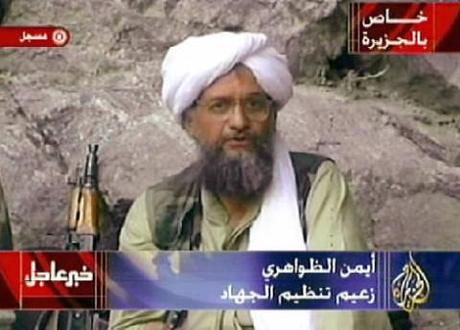
Ayman al-Zawahiri
The killing of Osama bin Laden and the reported killing of Abu Hafs al-Shahri, Al Qaeda’s commander in Pakistan, has observers wondering if the core of the terrorist network responsible for the 9/11 attacks is on the verge of collapse. Since the jasmine revolutions bloomed in Tunisia and Egypt, it has been widely argued that Al Qaeda has been ideologically caught off balance by the Arab revolutions, which it had nothing to do with starting. So, is Al Qaeda finished as a global force or are the obituaries being written prematurely?
One thing is for sure: Al Qaeda is not throwing in the towel. To chime with the anniversary of the 9/11 attacks, Al Qaeda released a 62-minute video that included a message from deceased former leader bin Laden along with one from current chief Ayman al-Zawahiri, the SITE Intelligence group told the Associated Foreign Press. In the video, entitled “The Dawn of Imminent Victory”, bin Laden insisted that Americans are “falling as slaves” to major corporations and “Jewish money.” Also in the video, Zawahiri welcomed the Arab Spring, calling the uprisings “a form of defeat for the United States,” which “is denying the fact that it is … facing a rising umah (Muslim community).”
- Successful decapitation efforts. CBS News’ World Watch blog quoted a NATO official, who said that news of al-Shahri’s death was seen by defense officials in western countries as “a major step forward. People are excited.” The blog noted that Al Qaeda has now lost a string of senior figures in quick succession. It noted that Atiyah Abd al-Rahman, the group’s second in command, was killed in a US drone attack in August and that Sheikh Yunis Al-Mauritani, a north African Al Qaeda militant, was killed in a joint US-Pakistan raid just outside the western Pakistani city of Quetta.
- “Is al Qaeda Really on the Ropes?,” pondered Bruce Reidel at The Daily Beast. Riedel insisted that the “exploitation of that library data recovered from Bin Laden’s Abbottabad compound “has clearly been a great boon to counterterrorist operations” but warned it’s wrong to assume that “al Qaeda’s done for quite yet.” Reidel reminded that Al Qaeda offshoots in Yemen and other locations “are still very dangerous and in some cases getting more so … And all analysts agree al Qaeda’s message still seems to inspire self-radicalized extremists inside the U.S. and Europe who, like the Fort Hood killer, may be very dangerous.” Reidel argued that for the West to keep up the pressure on Al Qaeda it must focus hard on Pakistan: “One thing is certain. We cannot rely on Pakistan’s government, Army, and ISI to deal with this threat. Whether they were clueless about bin Laden’s hideout for half a decade or complicit in hiding him, we cannot rely on them. Incompetent or worse, they are not reliable. So we need to retain a capability for the foreseeable future to operate inside Pakistan when we need to take out dangerous targets, whether by drones or SEALs.”
- “Going into Iraq was al-Qa’ida’s mistake,” suggested John Rentoul at The Independent’s Eagle Eye blog. Rentoul backed former head of the foreign intelligence service MI6 Sir Richard Dearlove’s opinion, expressed at a Thursday talk, that “’the al-Qa’ida narrative is losing its purchase on the Arab Street.’ In answer to David Davis, the Conservative MP, Dearlove said that the Iraq war accelerated the decline of al-Qa’ida, because it made a strategic error in trying to fight the US in a guerrilla war.”
The Al Qaeda “narrative is losing its purchase on the Arab street” said ex-MI6 head Sir Richard Dearlove.
- Iraq increased the terror threat. “Whether or not one supported the war, and there were good and bad reasons for doing so, it is undeniable that Iraq increased the terror threat and acted as a recruiting sergeant for al-Qaeda and its allies across the world,” insisted Mehdi Hasan at The New Statesman. To defend his point of view (and counter that of Rentoul), Hasan quoted a whopping 16 experts who have linked Iraq and an upsurge in terrorism.

